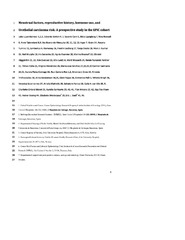Blar i forfatter Artikler, rapporter og annet (samfunnsmedisin) "Waaseth, Marit"
-
Endogenous Circulating Sex Hormone Concentrations and Colon Cancer Risk in Postmenopausal Women: a Prospective Study and Meta-Analysis
Mori, Nagisa; Keski-Rahkonen, Pekka; Gicquiau, Audrey; Rinaldi, Sabina; Dimou, Niki; Harlid, Sophia; Harbs, Justin; Van Guelpen, Bethany; Aune, Dagfinn; Cross, Amanda J.; Tsilidis, Konstantinos K.; Severi, Gianluca; Kvaskoff, Marina; Fournier, Agnès; Kaaks, Rudolf; Fortner, Renée Turzanski; Schulze, Matthias B.; Jakszyn, Paula; Sánchez, Maria-José; Colorado-Yohar, Sandra M.; Ardanaz, Eva; Travis, Ruth; Watts, Eleanor L.; Masala, Giovanna; Krogh, Vittorio; Tumino, Rosario; Sacerdote, Carlotta; Panico, Salvatore; Buenode-Mesquita, bas; Gram, Inger Torhild; Waaseth, Marit; Gunter, Marc J.; Murphy, Neil (Journal article; Tidsskriftartikkel; Peer reviewed, 2021-09-28)Background - Observational studies have consistently reported that postmenopausal hormone therapy use is associated with lower colon cancer risk, but epidemiologic studies examining the associations between circulating concentrations of endogenous estrogens and colorectal cancer have reported inconsistent results.<p> <p>Methods - We investigated the associations between circulating concentrations ... -
General practitioners’ role in safeguarding patients with dementia in their use of dietary supplements. A qualitative study
Risvoll, Hilde Monica; Risør, Torsten; Halvorsen, Kjell Hermann; Waaseth, Marit; Stub, Trine; Giverhaug, Trude; Musial, Frauke (Journal article; Tidsskriftartikkel; Peer reviewed, 2023-11-20)Objective - The use of dietary supplements (DS) may cause harm through direct and indirect effects. Patients with dementia may be particularly vulnerable. This study aims to explore general practitioners’ (GPs’) experiences with DS use by these patients, the GPs perceived responsibilities, obstacles in taking on this responsibility, their attitudes toward DS, and suggestions for improvements to ... -
Hormone replacement therapy use and plasma levels of sex hormones in the Norwegian Women and Cancer Postgenome Cohort : a cross-sectional analysis
Waaseth, Marit; Bakken, Kjersti; Dumeaux, Vanessa; Olsen, Karina Standahl; Rylander, Charlotta; Figenschaug, Yngve; Lund, Eiliv (Journal article; Tidsskriftartikkel; Peer reviewed, 2008-02-14)Background: Hormone replacement therapy use (HRT) is associated with increased breast cancer risk. Our primary objective was to explore hormone levels in plasma according to HRT use, body mass index (BMI) and menopausal status. A secondary objective was to validate self-reported questionnaire information on menstruation and HRT use in the Norwegian Women and Cancer postgenome cohort (NOWAC). Methods: ... -
Menstrual factors, reproductive history, hormone use, and urothelial carcinoma risk: A prospective study in the EPIC cohort
Lujan-Barroso, Leila; Botteri, Edoardo; Caini, Saverio; Ljungberg, Börje; Roswall, Nina; Tjønneland, Anne; Bueno-De-Mesquita, Bas; Gram, Inger Torhild; Tumino, Rosario; Kiemeney, Lambertus A.; Liedberg, Fredrik; Stocks, Tanja; Gunter, Marc; Murphy, Neil; Cervenka, Iris; Fournier, Agnès; Kvaskoff, Marina; Häggström, Christel; Overvad, Kim; Lund, Eiliv; Waaseth, Marit; Fortner, Renée T.; Kühn, Tilman; Menéndez, Virginia; Sánchez, María-José; Santiuste, Carmen; Perez-Cornago, Aurora; Zamora-Ros, Raul; Cross, Amanda J.; Trichopoulou, Antonia; Karakatsani, Anna; Peppa, Eleni; Palli, Domenico; Krogh, Vittorio; Sciannameo, Veronica; Mattiello, Amalia; Panico, Salvatore; van Gils, Carla H.; Onland-Moret, N. Charlotte; Barricarte, Aurelio; Amiano, Pilar; Khaw, Kay-Tee; Boeing, Heiner; Weiderpass, Elisabete; Duell, Eric J. (Journal article; Tidsskriftartikkel; Peer reviewed, 2020-05-28)<p>Background: Urothelial carcinoma is the predominant (95%) bladder cancer subtype in industrialized nations. Animal and epidemiologic human studies suggest that hormonal factors may influence urothelial carcinoma risk. <p>Methods: We used an analytic cohort of 333,919 women from the European Prospective Investigation into Cancer and Nutrition Cohort. Associations between hormonal factors and ... -
Progestin-only and combined oral contraceptives and receptor-defined premenopausal breast cancer risk: The Norwegian Women and Cancer Study
Busund, Marit Katinka; Stensland-Bugge, Nora; Braaten, Tonje; Waaseth, Marit; Rylander, Charlotta; Lund, Eiliv (Journal article; Tidsskriftartikkel; Peer reviewed, 2018-01-19)Receptor-defined subtypes of breast cancer represent distinct cancer types and have differences in risk factors. Whether the two main hormonal forms of oral contraceptives (OCs); i.e. progestin-only (POC) and combined oral contraceptives (COC), are differentially associated with these subtypes are not well known. The aim of our study was to assess the effect of POC and COC use on hormone receptor-defined ...


 English
English norsk
norsk



